112015_YKPT_B8.pdf





8B Heritage 2015
November 20, 2015 www.plaintalk.net
A Giving Spirit
Piece Of Vermillion History
Donated To W.H. Over Museum
BY ELYSE BRIGHTMAN
Elyse.brightman@plaintalk.net
COURTESY PHOTO: THE CLAY COUNTY HISTORICAL SOCIETY
The community of Vermillion has always had a giving spirit, willing to step
up and help those in need. Pictured is a Red Cross auction held in February
of 1918.
The Charity That Started It All
BY SARAH WETZEL
For the Plain Talk
Those who have visited the Civic Council
in downtown Vermillion might see just a
typical thrift store.
What they might not realize is this establishment is actually a charitable organization that has been around for close to a
century and has been a corporation for 50
years last summer.
“It was started by Mrs. Andrew Lee
whose husband actually ended up being
the governor of South Dakota,” said Wess
Pravecek, current President of the Civic
Council board. “She along with a lot of other
women in the community could see here
were areas in town where there was a gap
where people needed help, children needed
food. So they started by just having these
garage sale type things, maybe in somebody’s church basement. They would raise
some money and it just got moving from
there through many years. Sometimes you
don’t even really get to see the difference
you make but it can happen. That’s what
happened with the Civic Council. These
women knew they could make a difference
so they volunteered their time and then it
just kept going.”
“Mrs. Geppert said the original idea for a
Council should be credited to Mrs. Andrew
Lee, who carried on the work on a personal
basis,” reads a Plain Talk article from February 3, 1972. “The Vermillion Art Club and
the Federated Women’s Club were responsible for the first active organization in 1920.
The Council was incorporated in 1965 for
the express purpose of buying a building
in which to operate a thrift shop six days a
week, instead of the once a week sale that
had previously been held. Up until that time
it was an informal organization without any
rules or regulations -- just dedicated women
interested in helping the community and
those in need.”
According to the Sioux City Sunday Journal, in 1966 the Civic Council decided to buy
a former church building at 109 National St.
Donations at that time were gathered
from various collection boxes throughout
the city which were picked up by the Boy
Scout members of Explorer Post 214.
“By 1972 the council was ready to expand again,” reads a Plain Talk article from
1985. “The building which they now occupy
on Market St. was purchased. They paid
$50,000 cash for it. Their hours of operations were increased and the store is now
open all day, six days a week.”
Eventually as the business grew,
Pravecek said the building next to it was
also purchased and the store expanded.
While the location has changed, the
basic operation has remained the same,
relying on the giving hearts of those in the
Vermillion community.
“All of the items in that store are donated
by people in the community,” Pravecek
said. “The merchandise comes in the back
door, is purchased and taken out the front
door and that money is used to benefit the
community by hiring five to seven almost
full time people. Then we also pay taxes and
pay our utilities and our garbage bills and
things like that but then the money goes
back into the community.”
The first paid employee around 1970 was
Mrs. Ruth Brookman according to the Sioux
City Sunday Journal.
Back then shoes sold for 50 cents, a
dress for $1 and a man’s suit for $1.50.
According to Pravecek, the organization
exists to fill needs which is another thing
that has not changed for 90 years.
“We get requests from organizations
and individuals,” she said. “We take a look
at what does this need and can we fill that
void somehow just like it started in 1920. It’s
one of those things that if it wasn’t for the
generosity of the people in the community
who support the store by donating their
gently used items and then coming back in
the front door and shopping, that’s how this
thing keeps going.”
The Sioux City Journal on April 26, 1970
shared how the Council made a difference
back then.
Mrs. Ruth Brookman was President of
the Vermillion Civic Council at the time.
“With the money from the clothing sales,
the council has always helped with the immediate needs of the poor,” it reads. “When
the council was established, Mrs. Brookman
said, there was no welfare committee in
the city and thus no place where the needy
could go.”
The ‘Meals on Wheels’ program was
started by Civic Council, buying the necessary equipment including Pyrex plates,
stainless steel covers and heated carts.
“They have helped with things such as
glasses, dental care, warm clothing and hospital bills,” reads a Plain Talk article from
February 3, 1972. ““The milk program in the
schools was first initiated by the Council.
Various health clinics have been sponsored
by the Council. These functions were later
taken over by other organizations, but the
initial need was met by this unique organization...The Council did welfare work before
the welfare office was established.”
Along with continuing to fund various
things the Civic Council currently holds
periodic drawings and discount days to
benefit those shopping there.
“We do drawings all the time,” Pravecek
said. “You just go in and shop and put your
name in the drawing. At Christmas time
we’ll do a drawing for four gift cards, two
from HyVee, two from WalMart. We have
half-price days. We have spin-the-wheel
days, all sorts of things. We’ve been pretty
proud of the fact that we have kept prices
low. We check around. we go to thrift stores
in other towns and see how they do it. We’re
always game for improvements. There’s
a lot of times when we have to put some
money into the infrastructure of the store.
But boy, we’re thrifty people. We know that
we have to be good stewards of the money
that’s made through that store so we’re not
frivolous about how we use that money. We
want to make sure the community sees a
difference.”
People from different organizations
volunteering their time is actually how the
Civic Council got its name.
“It’s also taken a whole lot of people who
have been willing to serve as representatives from their church or their civic organization that have worked this many years
to keep it going,” Pravecek said. “To me it’s
one of the longest lasting super powers of
the community, for lack of a better term.
Just because it’s the goodness of people’s
hearts and that’s what I’m so proud of Vermillion about.
“People in the community need to be
really proud of the fact that they have kept
this not-for-profit business going. My serving on the board is a joy for me. I just see
the benefits that it gives to the community
and it makes me feel good doing it.”
Pravecek herself has been involved
about 20 years.
“I served as a member and a volunteer,”
she said. “As a volunteer you can go down
and wash some of the dishes that come in.
I’m going down this afternoon to help assemble Christmas trees so the staff doesn’t
have to use every minute of their time to do
all these things. It’s a matter of people who
are willing to give their time and the things
from their home. It will benefit somebody
else by putting it in the store and making it
available for somebody to buy. The store is
not just for people who are needy and shopping there. The thrift store idea has just
taken off and has gotten to be a booming
business all over the country. What’s different about ours is the money we make goes
back to the community.”
All things considered, the Civic Council
IS the community with members and volunteers from dozens of organizations pushing together to run this one project just as
other local charities run.
“The Welcome Table is really not a part
of the Methodist church,” Pravecek used as
an example. “It’s part of a whole community
organization. That church just happens to
open their doors and house it. It’s like the
food pantry. It’s not a Lutheran-based project. It just happens to be located in their
church and it’s community once again that
makes that move forward and giving back to
the community where there’s a need. We’re
all about two paychecks from being in the
same boat sometimes so I think that we’re
realistic about if you’re going to take something from the community then you need to
give back. That’s kind of what drives me.”
Not just the rich heritage of the organization but future generations is another
driving force for Pravecek.
“I want my kids as adult women to know
what i’ve made a priority in my life so
when they’re making it through the turmoil
of raising children, getting a foot in the
door with their jobs, if they get a chance,
whatever community they’re in, I want them
to think about this,” she said. “That’s why
when we go up and do the scholarship at
the high school, I want people to know that
the Civ isn’t just a funny place you go to to
get something for Halloween (however I get
the best Halloween costumes I put together
ever from stuff I buy there.) There’s cool
stuff in there. There’s great furniture once in
awhile, there’s stuff you can start an apartment with, there’s great clothing in there.
Sometimes you just have to look. We’re kind
of a quiet lot and don’t toot our horn too
much but we want people to be aware of the
difference they can make by donating and
shopping.”
On Monday afternoon
members of the Verzani
family gathered at the W.H.
Over Museum to donate
the first homestead title
granted in the Vermillion
Dakota Territories to be
put on display.
This document, signed
by President Ulysses
S. Grant, was issued to
Francis Verzani in 1872
under the Homestead Act
of 1862.
“I’ve had custody of it
for quite a few years now,”
said George Verzani, greatgrandson to Francis. “My
dad gave it to me. And my
dad got it from his mother
and she lived in Sioux City
and my dad lived in Sioux
City and I figured the best
place for it would be here
in the museum so that
other members of the family could see.”
The Homesteading Act
of 1862 allowed immigrants to settle land provided by the government.
Living on the land for five
years allowed the settlers
to acquire the plots free of
charge. Immigrants were
also allowed to buy the
land outright.
“That really marks the
beginning of the historic
period where you get the
whites coming in and settling and you get a whole
series of things going on
in terms of displacing the
people that were here and
then opening the area up
to homesteading,” said
Larry Bradley, president
of the board of directors
at the W.H. Over Museum.
“All you had to do was live
Prentis
From Page 5B
acres to provide for parking
space and enable the construction of Prentis Street
along the east edge in 1936,”
says the NRHP.
Over the next few decades many features were
added to the park to make
it more recreation friendly
to the people of Vermillion.
All of these features are still
standing today, with the
exception of the caretaker’s
house, and many are going
through renovations to improve use for park goers.
The swimming pool, was
rebuilt in 1965 and included
the addition of a bathhouse
and is currently preparing
for another makeover. The
new amenities will include a
lazy river, water slides, floatable water walk, basketball
hoop, one-meter diving
tower, shade structures and
zero-depth entry, water features, bench and shade.
Preparation has already
begun for construction set
to commence next year.
“If you see right in front
of the pool between Plum
and the pool, there’s kind of
a dugout area where we’re
putting the transformer in
there for the new pool so
they can start construction
for the new pool next year
and still have power for the
old pool,” Goblirsch said.
“We’re working on the waste
water, the sewer systems
ELYSE BRIGHTMAN/FOR THE PLAIN TALK
The Verzani Family gathered at W.H.Over
Museum on Monday afternoon this week to
donate a piece of their family’s history to the
community, the original homestead document
signed by President Grant.
on it, so they would build
a shack on the land, or
whatever, and they would
live there.”
Francis Verzani was the
seventh applicant for a
homestead title, but was
the first to receive the
grant.
“He had to live there
for five years on the
land in order to get the
certificate,” George said.
“He got the first certificate
in the Vermillion Dakota
Territory.”
The Verzani’s settled
on 173.7 acres of land with
160 covered by the land
grant and the extra 13.7
purchased outright. His
land was located along
the Missouri River just
southeast of the mouth of
the Vermillion River and
southwest of the town of
Burbank. It now sits under
the water of the ever
changing Missouri River.
Along with the document, the family also
donated a baby shoe, a pillow and a few small items
reflecting that time period
for display at the museum.
“I can see an exhibit
with some of the objects
from that time period kind
of linking it together,”
Bradley said. “We have to
pretty careful with some of
those documents with the
sunlight coming through
will fade them if we put it
up front.”
Bradley is hoping the
donation will encourage
other families to donate
historical items.
“The next generation
may not care about them
and that’s what happens
to a lot of things,” he said.
“The museum is here,
essentially, in perpetuity.
From now on these objects
will be curated and available where a lot of these
collections and material
get dispersed and people
don’t’ take care of them
and then disappear and
then they’re gone.”
are getting ready for the
new pool, as well.”
The log cabin at the
southwest corner of the
park has been standing
since 1933. The cabin is
affectionately known at the
Girl Scout hut because of
the work Vermillion Girl
Scout troops have put in to
maintain the cabin and prevent vandalism. The cabin
recently had a new paint job
and a new roof put on from
the city, with help from the
girl scouts.
The baseball diamond
still stands in its original
place thought the football
field has been removed.
Work is also being done
to that area of the park to
improve the experience for
game spectators, including
new restroom facilities.
“Its dual sided restroom
facility, one for the park,
which will feed over by the
playground where people
can get into it; it’s a unisex
handicap accessible facility
and the other side, for the
baseball field,” Goblirsch
said. “We are putting a new
backstop in for the baseball
field, a cement one, so we
can have it a little bit safer
over there for the public.
We weren’t pleased with the
way the nets were going all
the way to ground, so we
put a permanent cement
backstop in.”
The caretaker’s house,
which stood on the center
block of Prentis Avenue,
was removed last spring to
make way for more parking available to patrons.
All other amenities at the
park — picnic shelters,
playgrounds, horseshoe pit,
basketball courts and band
shell — still stand in the
original locations and are
just some of the activities
the park has to offer.
“People might not notice
is the amount of Frisbee
golf that is played there and
just the people who come
over and just have lunch
there when the weather is
nice enough to do so and
sit in the band shell just
quietly by themselves or
with their spouse and the
kids do a lot of just hanging
out over there,” Goblirsch
said. “It does get used quite
heavily and we get a lot
of compliments when we
move the snow off the trails
and sidewalks and people
use it in the winter time,
as well. And even if you go
over there and there’s some
fresh snow, we’ll see some
cross country skiing tracks
in there.”
Prentis Park is located
just blocks from the University of South Dakota
and puts it within walking
distance from just about
anywhere in town.
The park is now maintained by the Parks and
Recreation department with
help from the city.
“The parks side of it
maintains it all, but we’re
such a smaller department.
We don’t have (all) the
equipment,” Goblirsch said.
“Light and power and the
(city) streets department
do a lot of things to help us
here to make it what it is
today.”
Always a
higher level
of service.
CorTrust Bank’s personal service and mobile banking help you
get more out of every day and every dollar. Visit CorTrust Bank today.
Raise your expectations.
cortrustbank.com • 101 W. Main St. • Vermillion

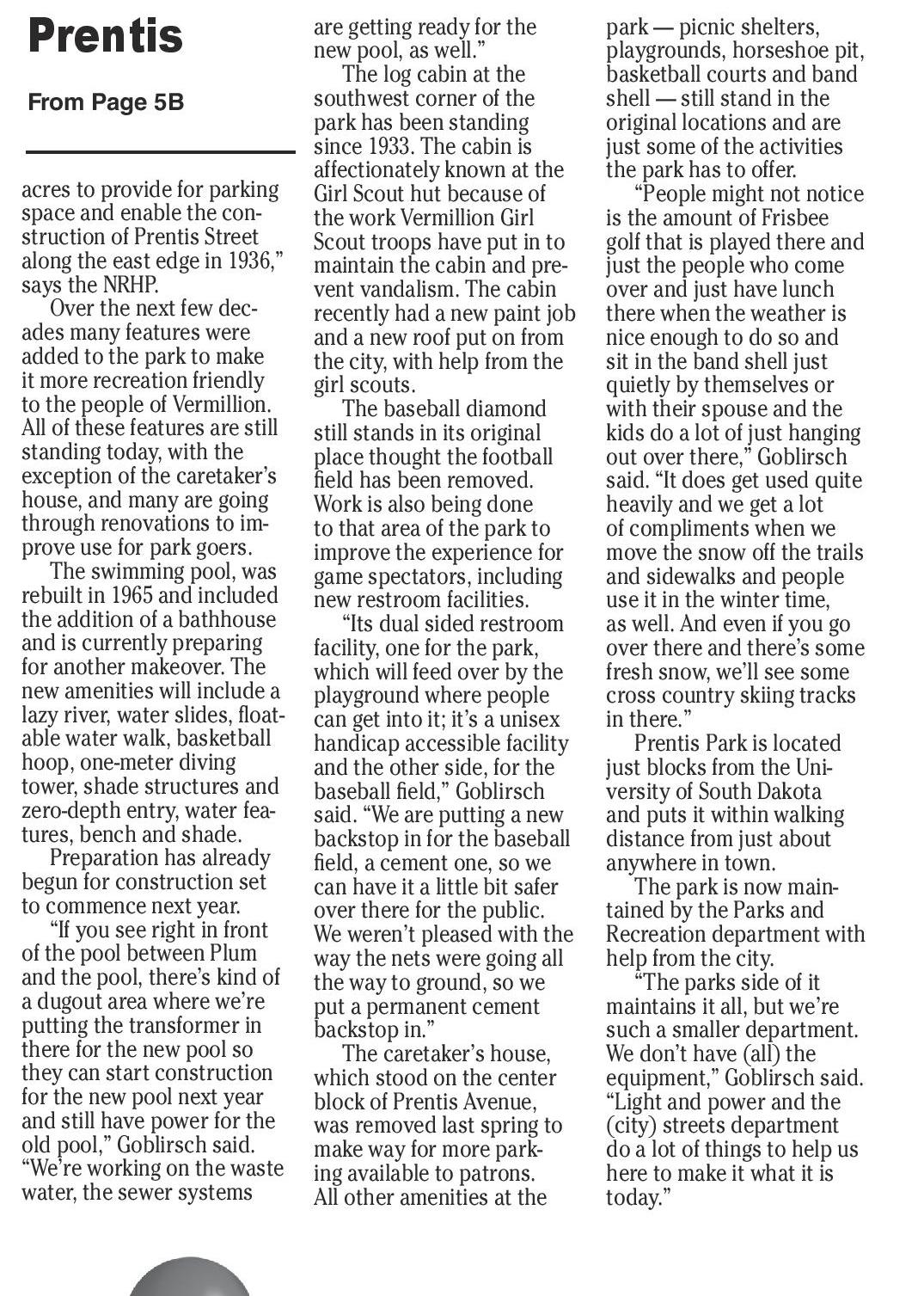
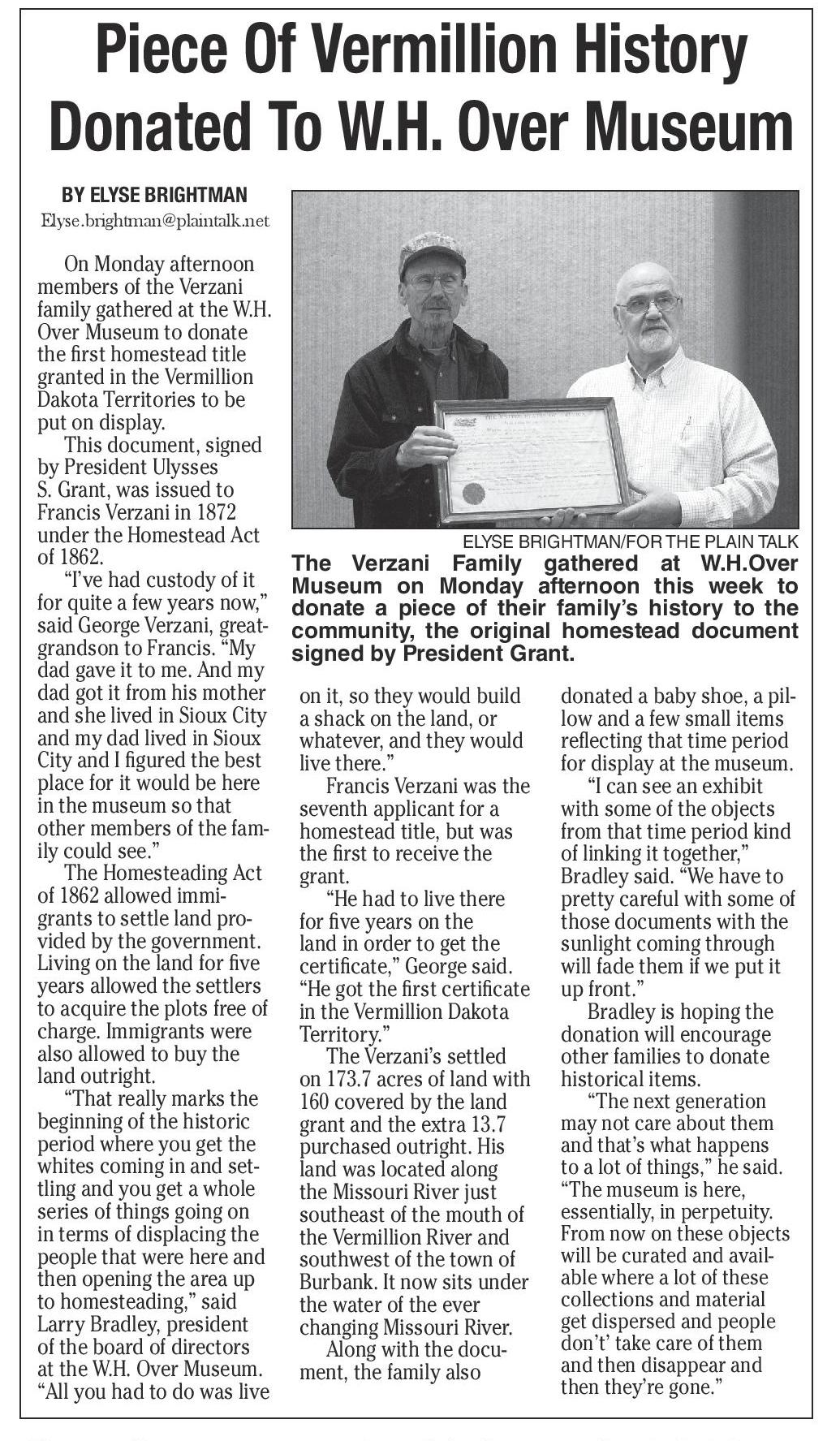
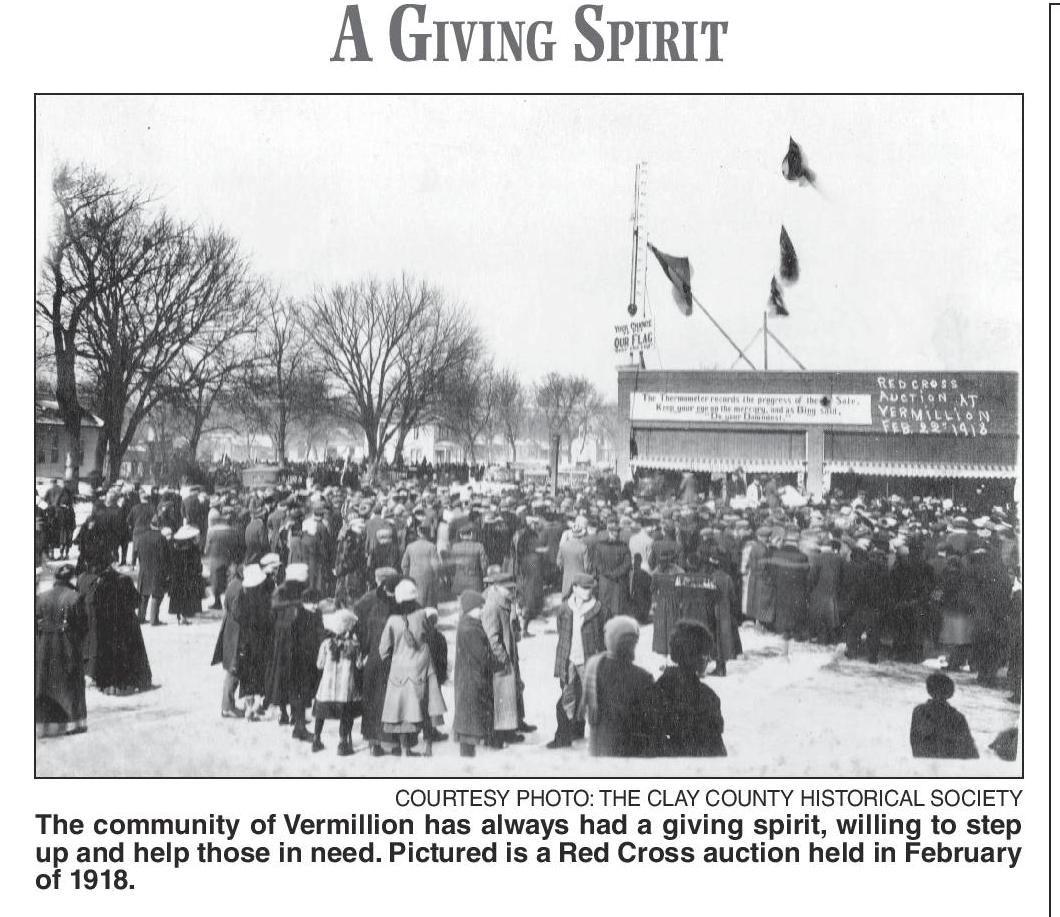






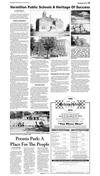

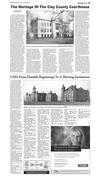





 Previous Page
Previous Page






